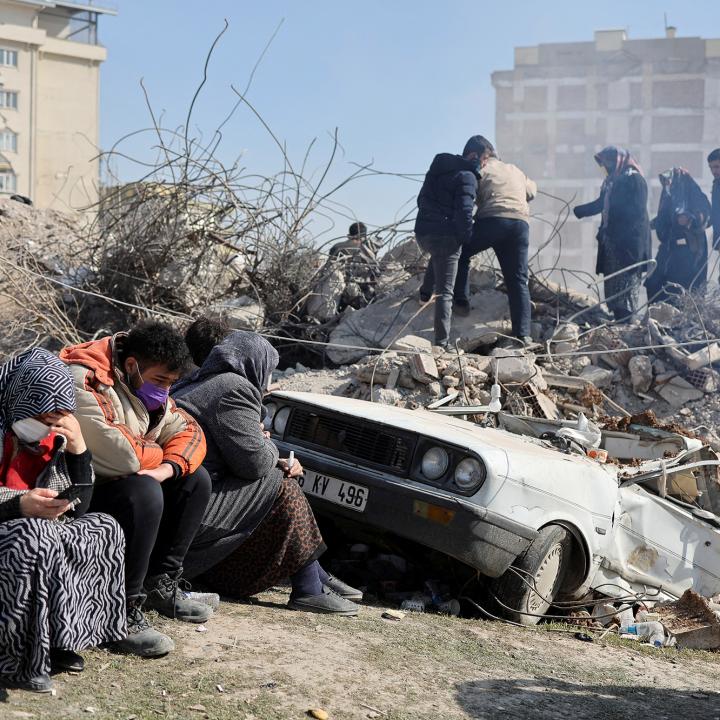
- Policy Analysis
- PolicyWatch 3704
Earthquake in Syria and Turkey: U.S. Policy Implications

A panel of experts offers on-the-ground insights from the disaster zone and discusses the political and policy consequences of the still-unfolding humanitarian crisis.
On February 15, The Washington Institute held a virtual Policy Forum with Can Selcuki, Amany Qaddour, Soner Cagaptay, and Andrew Tabler. Selcuki is an economist, data analyst, and the director of Turkiye Raporu. Qaddour is the executive director of Syria Relief and Development. Cagaptay is the Institute’s Beyer Family Fellow and director of its Turkish Research Program. Tabler is the Institute’s Martin J. Gross Senior Fellow and former senior advisor to the U.S. special envoy for Syria engagement. The following is a rapporteurs’ summary of their remarks.
Can Selcuki
Until one sees Hatay, Turkey’s southernmost province struck heavily by the February 6 earthquakes, it is impossible to grasp the extent of the local destruction and humanitarian crisis. The damage is far beyond that shown in the media. Machines have recently begun clearing the rubble, which means almost all hope of finding survivors is gone. The most recent announcements place the death toll at around 33,000, but judging by the number of buildings destroyed, the final figure will be much higher.
Although the scope and magnitude of this disaster would have been too big for any government to handle easily, Turkish authorities failed to respond strongly enough in the first forty-eight hours. The military should have been deployed from the get-go, since it has the right resources, experience, and chain of command to provide relief after a major disaster. In contrast, the government’s emergency agencies have shown poor coordination throughout, and some regions have yet to receive substantial help from Ankara. This should come as no surprise because pre-earthquake audits of the Interior Ministry’s Disaster and Emergency Management Presidency (AFAD) indicated that the agency was not ready to respond to such a catastrophe. One recent disaster simulation even outlined what damage would occur if a 7.5-magnitude earthquake hit the region and what steps would need to be taken, but the government ignored the report.
Another major problem is Turkey’s failure to enforce its construction code in recent decades. After the devastating Marmara earthquake in 1999, authorities developed a solid construction code to prevent such large-scale destruction from happening again. The government should have enforced this code; instead, it granted amnesties to developers, which allowed for suboptimal construction projects.
As a result, any assessment of Turkish politics conducted before this disaster is now irrelevant. We are in a new paradigm. The public is deeply angry about the government’s response, yet authorities have answered this disdain by claiming that no government could have adequately navigated the catastrophe of a century.
Thankfully, Turkey has the fiscal and financial capacity for reconstruction in the immediate term. How the longer-term scenarios play out will depend on when the planned presidential and parliamentary elections are held. President Recep Tayyip Erdogan has been using proxies to push for postponing these votes, but such a move would be illegal unless parliament agrees to change the constitution. If elections are postponed based on a decision by the Supreme Election Council—which some have speculated may arrive in a couple weeks—then Turkey will enter an era of unconstitutional governance.
Amany Qaddour
My organization has staff unaccounted for in Gaziantep and Antakya, so our first goal has been to stabilize our teams so that they can quickly mobilize and start responding to the unprecedented humanitarian needs in Turkey and Syria. In the meantime, many residents in the affected areas are outraged by the situation and feel abandoned by the international community. Every single hour wasted has meant more lives lost.
In northwest Syria, local organizations are the ones that have been helping on the ground since the start. At a time when international assistance had yet to materialize in this area, organizations such as the White Helmets were performing search and rescue operations. Going forward, foreign governments need to build up and support first responders in moments of disaster. The U.S. government has the ability to support more Syrian American diaspora and local organizations rather than having aid trickle down through large bureaucracies.
Another priority in need of investment is caring for and protecting aid workers. The UN and the Inter-Agency Standing Committee did not scale up the activation, deployment, and coordination required for a sufficiently large international response until February 14, more than a week after the disaster.
Moreover, logistics and politicization are no excuse for withholding desperately needed humanitarian aid. Every single crossing point into Syria needs to be activated, and the next UN Security Council resolution needs to include an indefinite opening of these points. The U.S. government has more resources than any other country in the world, and the capability to deploy a massive number of individuals with the skills to save lives.
As for international sanctions, the humanitarian assistance effort has not been affected by them. NGOs have been operating in both “Government of Syria” areas and opposition-held territory; in fact, they are the lifeblood of the relief effort in all affected areas of Syria. Thus, lifting sanctions now only perpetuates the “normalization” narrative that has emerged in the past few years related to reconstruction efforts.
Soner Cagaptay
Turkish politics is entering terra incognita. In terms of the human toll, the February 6 earthquakes constitute the most significant natural disaster in the country’s modern history and will reset most of its previous sociopolitical dynamics.
The many problems with the government’s initial response included a failure to deploy the gendarme—a public safety arm of the military—early on and in large numbers. Moreover, Erdogan has gutted Turkey’s relief agencies over the past decade, replacing their executives with loyalists and rendering the organizations dysfunctional. Predictably, these agencies have failed to provide adequate and well-coordinated assistance since the disaster.
In contrast, civil society has done well, often surpassing government-led rescue efforts. Even a Turkish rock star—Haluk Levent, who heads the NGO Ahbap—has done more than some government agencies. This shows the strength and resilience of Turkey’s middle class and civil society—a good sign for the country’s future.
While some images from the disaster zone highlight the power of the earthquake by capturing the destruction of entire neighborhoods, other images show intact apartment blocks standing next to completely pancaked blocks—which is more a sign of construction code violations and corruption. Hence, the disaster will pose a substantial political challenge to Erdogan. He has long cultivated a domestic image as an autocratic yet effective leader—the efficient “father” of the nation. His brand is that he takes care of the people, but this brand is now being tested. In his first address to the public after the horrific disaster, Erdogan angrily chided citizens for criticizing the government’s response instead of simply embracing them.
Moving forward, Erdogan will face even more scrutiny for the troubled relief effort and evident construction violations. In response, he will likely double down on the fear factor, attempting to appear stronger and more autocratic, as seen in the aforementioned speech. He might also attempt to postpone the forthcoming elections, but that would violate the constitution, which does not allow for such postponements except in the case of war. At the moment, war is not a possibility at all—in fact, Turkey’s relations with its neighbors are improving. All of these states have come to Turkey’s aid since the earthquake, most notably Armenia (which has no diplomatic ties with Ankara) and Greece (whose terrific public diplomacy has boosted its public standing in Turkey after years of hostility).
Elsewhere, countries such as France, Germany, Spain, Sweden, and the United States have provided generous help as well. Although this response will not magically solve their various bilateral problems with Ankara, it will likely reset much of the Turkish public’s mindset toward the European Union, NATO, and the broader West. Over the past decade, the government and its media allies have helped mainstream anti-Western sentiments and conspiracy theories, frequently insisting that the West is Turkey’s “other.” Yet as citizens see European and Western rescuers pull people out of the rubble, many of them will likely begin to question this narrative. Israel has sent a powerful message as well, deploying the second-largest rescue team after Azerbaijan.
Andrew Tabler
The Assad regime has agreed to reopen two additional border crossings for UN aid into northwest Syria, but this gesture is largely an empty one. For one thing, the agreement is limited to three months, an insufficient period for such a major disaster. Moreover, the regime has a long track record of weaponizing and diverting any aid that passes through its hands, including assistance intended for areas of the country no longer under its control.
The United States, Britain, Canada, and the EU have collectively provided around 91 percent of the aid sent to Syria every year. Accordingly, they should push for a UN Security Council resolution ensuring that all available aid crossings into Syria are opened for at least one year, thereby preventing Russia from using its veto power to complicate humanitarian assistance during that period.
The U.S. government should also appropriately relax sanctions on Syria to support legitimate earthquake relief—though without giving the regime amnesty from its conduct during the war. On February 8, Washington released General License 23, which authorizes transactions related to disaster relief but also allows entities to work with the “Government of Syria,” potentially opening loopholes for the regime and its foreign allies.
To address these issues, the White House should request an imagery-based intelligence assessment to see what has been specifically damaged by the earthquake rather than the war. This report would enable the administration to monitor what relief money is being spent on over the next few months. Toward the same end, Washington should consider the creation of a “white channel” for humanitarian aid into Syria, similar to what the Trump administration authorized for Iran in October 2020.
This summary was prepared by Sude Akgundogdu and Erik Yavorsky. The Policy Forum series is made possible through the generosity of the Florence and Robert Kaufman Family.






